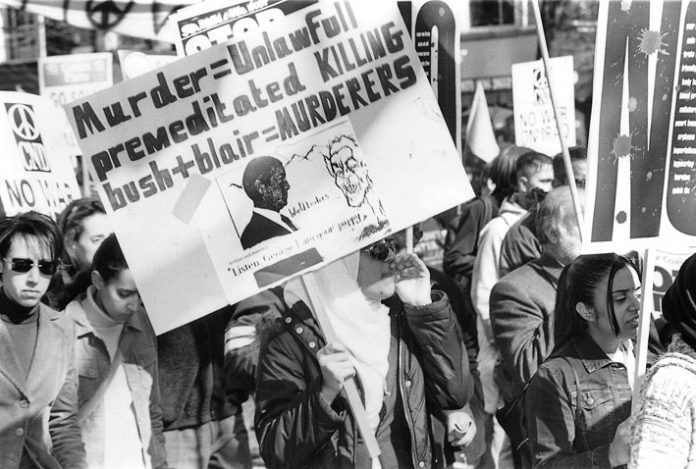WHEN Tony Blair’s chief of staff from 1997-2007, Jonathan Powell, was questioned yesterday about the September 2002 dossier that took the UK to war on Iraq his memory seemed to fail.
In his evidence to the Iraq Inquiry, he agreed that the foreword to the dossier by Blair was different from the main content.
Sir Lawrence Freedman asked about Blair’s claim that it was ‘beyond doubt’ that Iraq had weapons of mass destruction (WMD).
Powell replied: ‘Well, you can subject documents like these to a degree of textual analysis that they cannot bear.
‘There’s a danger of dancing on the head of pin on these things.’
He added: ‘I think you’re attaching too much importance to a preface.
‘The body was more important. In retrospect maybe the right thing to do would have been to put out the JIC documents themselves, rather than produce a dossier.’
Freedman put it to Powell, that he had redrafted a paragraph in the ‘fourth dossier’ which had said that Iraq would only use chemical weapons if it came under attack.
Powell admitted that he did, claiming his concern was ‘Saddam was a threat and if left he would hit us’.
Asked about the ‘45-minute headline’, Powell said: ‘Looking back, I can’t remember what my reaction was, maybe thinking it was a damp squib.’
Commenting on the Evening Standard headline, he admitted that he did ask Alastair Campbell what it would be, but claimed that was ‘just a bit of a dig’ over Campbell’s failure to predict the paper’s coverage of Ken Livingstone in earlier years.
Earlier in his evidence, Powell said that the West’s policy of ‘containment’ had come to an end in 2001.
Asked about whether there was consensus in the UK Cabinet that containment was dead, Powell said that in 2003, Robin Cook was still pushing the case for sanctions.
Powell added that foreign secretary Jack Straw realised that containment would not work.
He added: ‘I think Straw was looking at it politically, at problems with the parliamentary Labour Party.’
Taking over the questioning, Sir Roderic Lyne returned to the September dossier.
He put it to Powell: ‘You said the dossier was not of importance but it was discussed by prime minister Blair and president Bush.
‘Alastair Campbell’s diary says questions of “why now” and the dossier and the Prime Minister’s speech were important.’
Powell claimed that ‘‘‘why now” was to get the Americans to go down the UN route’.
Lyne pressed him: ‘The prime minister said on 24th September that evidence of Iraq’s WMD programme was “active, detailed and growing”.
‘Was there evidence it was growing?’
Powell replied: ‘Again my memory is not going to be able to give a correct answer to that, I simply can’t remember.’
Earlier in the inquiry Sir Christopher Meyer and Sir Jeremy Greenstock had suggested that Britain had wanted more time to work on a diplomatic/UN solution.
Powell said they were wrong: ‘The answer is: more time would have achieved nothing,’ he insisted, because there was no WMD in the first place and ‘you might have discovered nothing’.
He agreed that the ‘period of military mobilisation’ had begun in the summer of 2002 but had been kept within the knowledge of a few at Westminster.
He added: ‘If the Americans had been unable to use our bases on Diego Garcia or Cyprus, they would have had real difficulties.’
He added that there was ‘consideration of a fireman’s strike in November 2002, which would have meant we would not have been able to participate.’
Powell said the mass marches in 2003 had shaken him and he had thought at one point Blair might be brought down.
